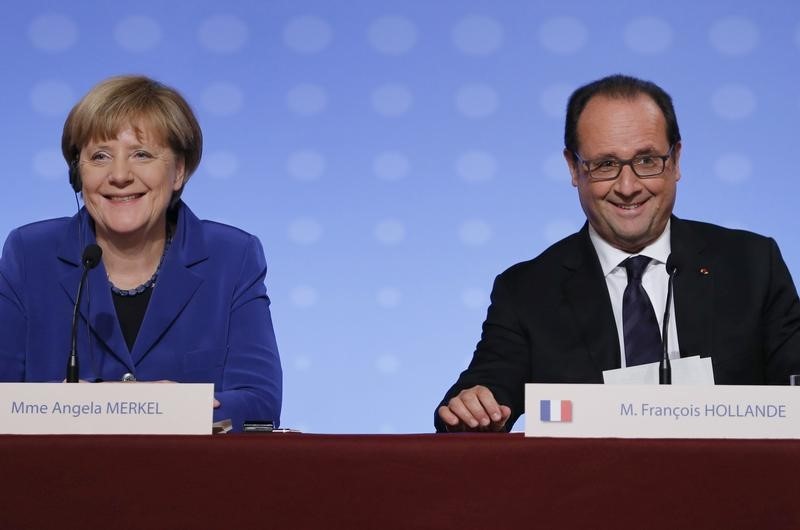Merkel, Hollande plead for unity in face of EU crises

But a tone of mutual congratulation for the reunification of Germany and embrace of ex-communist eastern Europe into the EU over a quarter century was marred by vocal Eurosceptics in the Strasbourg chamber, whose rise poses a threat to the Union — and to the re-election prospects in 2017 of both the conservative German leader and her Socialist French counterpart.
“This is a test of historic proportions,” Merkel said from a shared podium where she exchanged frequent smiles and occasional asides with Hollande during nearly two hours of debate that offered little in the way of concrete new policy statements.
Acknowledging this year’s troubles in cutting a deal to bail out bankrupt Greece and bitter arguments, especially with eastern states fearful of immigration, she said finding a common approach on absorbing refugees would lead to economic benefits, adding: “The opportunities are greater than the risks”.
Describing a “succession of crises”, Hollande warned of a “total war” between sectarian rivals in the Middle East that would reach European territory without global efforts to end the conflict in Syria. And he took aim at his anti-EU opponents, saying a retreat behind national frontiers would weaken France.
“Each crisis raises fears … Nothing is more vain than trying to take cover alone,” he said. “There is no alternative to a strong Europe to guarantee our sovereignty.”
NATIONALIST ATTACKS
National Front leader Marine Le Pen responded with a furious attack on Hollande and his conservative predecessor when leaders of the parliament’s main party blocs were given the floor.
Addressing him as Merkel’s “vice chancellor, administrator of the province of France”, Le Pen accused Hollande of selling out to a Europe run from Berlin and labelled Merkel “totally irresponsible” for offering to take in more Syrian refugees.
From the far left as well as the far right, the chancellor heard critics of Germany’s handling of Greece’s debts and insistence on austerity budgets in the euro zone.
Merkel hit back at criticism from the Greens over cheating in pollution tests by carmaker Volkswagen. The company was responding she said. And on a day when data raised concerns of an economic slowdown in Germany, she warned against using the scandal to damage the car industry and put many jobs at risk.
Recalling Kohl and Mitterrand in 1989, UK Independence Party leader Nigel Farage said that at the time France and West Germany were a “partnership of equals” in the EU but that, weakened by the demands of the euro, France’s voice was “little more than a pipsqueak” in a “totally German-dominated Europe”.
That echoes more widespread concerns in the bloc that French economic weakness and the increase of German power brought by its reunification in 1990 has destabilised a bloc founded on the post-World War Two reconciliation of the two countries.
Merkel and Hollande, while insisting they will not dictate to the other 26 member states, appeared determined to try and counter suggestions the EU’s “Franco-German motor” has stalled.
“We must employ much greater powers of persuasion in favour of our Europe,” Merkel concluded. “I am glad, dear Francois Hollande, that after centuries of war and hatred between our two peoples, we are both here today fighting for this same goal.”















































